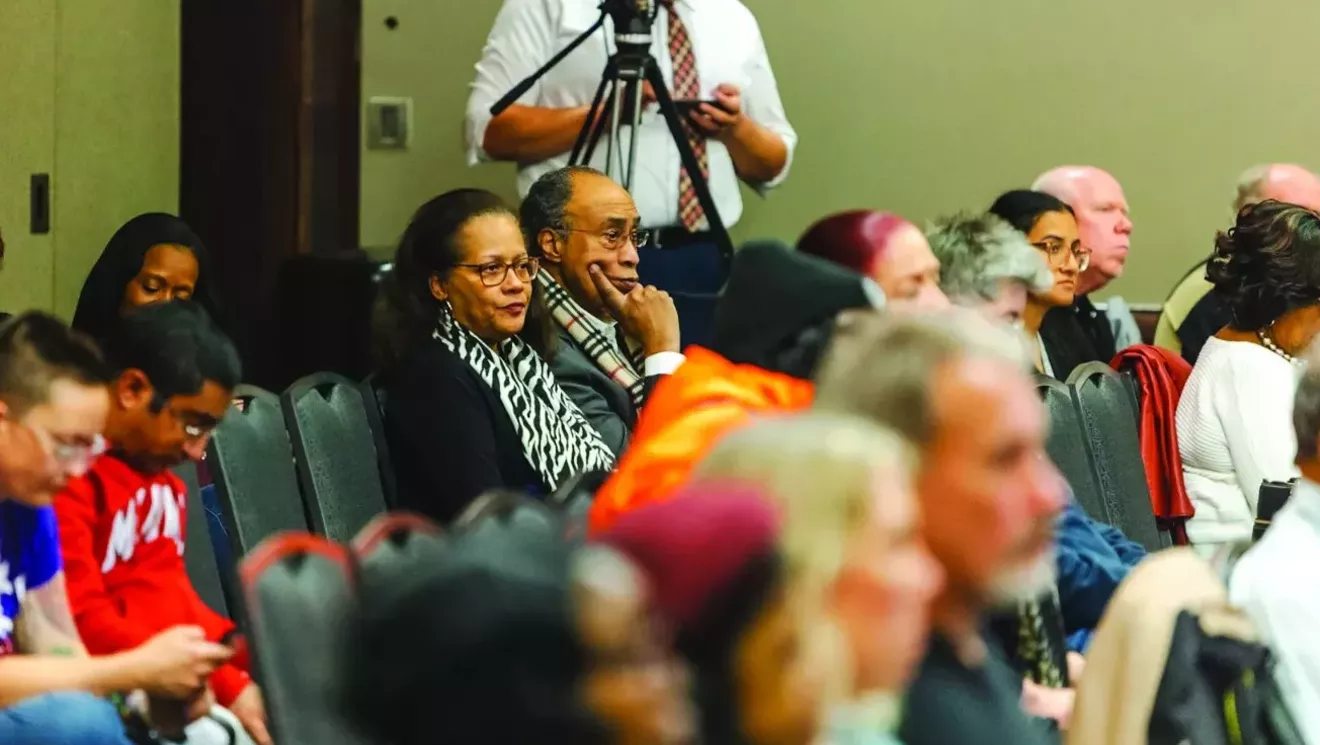
PHOTO BY 1221 PHOTOGRAPHY
A Massey Commission hearing on Dec.16, 2024.
The Massey Commission’s law enforcement work group met Aug. 4 and tried to finalize recommendations to offer up to the full commission, largely focusing on how to strengthen the SAFE-T Act’s transparency provisions.
Work groups are submitting their final recommendations to
the full commission by next month, with the commission’s full report due by
Oct. 1. Earlier this week, the Law Enforcement Hiring, Training, Wellness and
Cultural Competency work group deliberated over the recommendations to offer up
to the full commission, which meets Aug. 11.
“Despite the SAFE-T Act’s reforms, there are gaps in the enforcement
of the decertification process, and we heard that through multiple platforms,” Sunshine
Clemons, founder of Black Lives Matter Springfield, said at the Aug. 4 work
group meeting. “We want to focus on that if we’re going prepare to talk to
legislators about it in September.”
The SAFE-T Act, which featured a sweeping set of criminal
justice reforms, was signed into law in 2021, but didn’t fully take effect
until 2023. Most press coverage of the bill has focused on the elimination of
cash bail, but the act featured hundreds of pages of alterations to Illinois criminal code and policing standards.
A more digestible report on the changes enacted by the law can be found through the Illinois
Sentencing Policy Advisory Council, a 20-person board mostly comprised of state
legislators, lawyers and police officers. The council was “unable to determine
how many misconduct cases would be charged” through at least one of the SAFE-T
Act’s increased oversight measures – a section of the law made it a felony offense
for police officers to not comply with body camera laws.
Impact for Equity, a racial justice policy center based in
Chicago, wrote last year that the discretionary decertification provision,
which allows civilians and police departments to submit complaints about actions
that could be grounds for decertifying a police officer, within the SAFE-T Act
was “not fully functional” despite hundreds of complaints filed.
Even with more than 100 open cases, the Illinois Law
Enforcement Training and Standards Board held zero hearings for discretionary
decertification in 2024, according to the Board’s 2024 report on police misconduct, as it weighed finalizing rules on
administrative hearings. The Board finalized rules in April 2025 and the Illinois Law Enforcement Training and Standards
Board informed Illinois Times that the goal is to begin hearings by the
end of the month, though no dates have been finalized.
Amy Thompson, a policy expert at Impact for Equity, wrote
that the lack of progress on a law signed more than four-and-a-half years ago
hurts trust in the criminal justice system.
“The discretionary decertification system has faced such a
prolonged delay, stalling what is a key element in this accountability system,”
Thompson wrote. “Hopefully, with the recent passage of these rules, hearings
will begin soon.”
Jorge Camacho, director of Yale Law School’s Justice
Collaboratory and editor of multiple reports submitted to the commission’s work
groups, told IT the ideas floated in those papers – which can be found
on the Massey Commission homepage – represent widely accepted best policy practices. Because
of that, Camacho said, there may be some redundancies between SAFE-T Act reforms
and the recommendations discussed by the commission.
“Our recommendations were really intended to provide a
snapshot of what the most immediate best practices and best policy
recommendations are out there. A lot of it was based on what other
jurisdictions have done,” he said. “So, there might be areas where our
recommendations either depart from the reality of what’s going on in Illinois
or might be repetitive.”
But Camacho said that isn’t necessarily a concern, since the
commission should be restrained in what it ultimately advises the Sangamon
County Board to act on.
“I know that they are cognizant of some of the limitations
that that come with this responsibility, namely that you can’t just go and
recommend everything under the sun, right? There has to be some type of
screening process,” he said. “It has to be responsive to what the needs are – and
to an extent – what the political realities are within Sangamon County.”
The next Massey Commission hearing will take place Monday, Aug.
11 at the Ruby Recreational Community Center where members of the Ferguson
Commission, now the nonprofit Forward Through Ferguson, will be in attendance.
Work group information and more can be found at sangamonil.gov/masseycommission.


